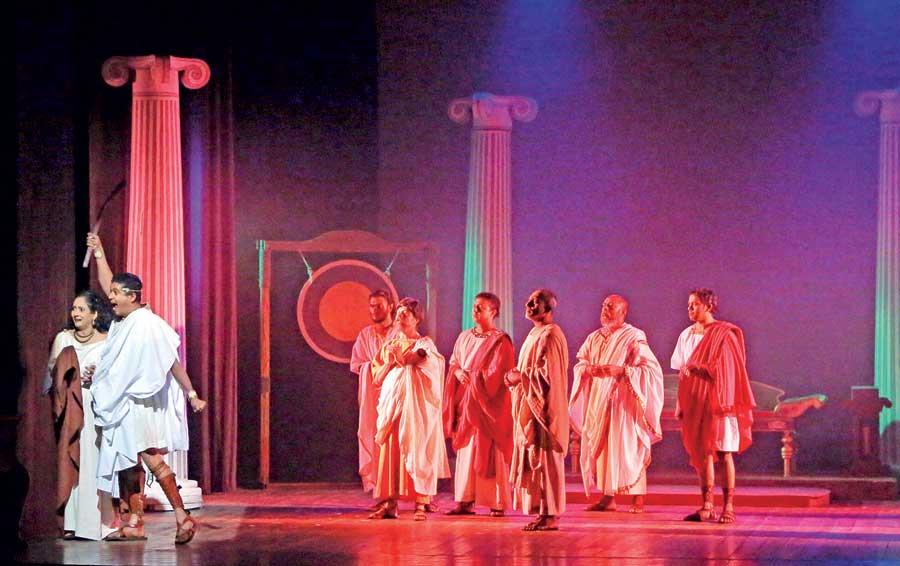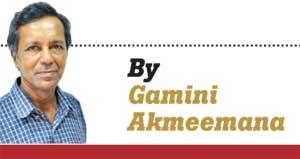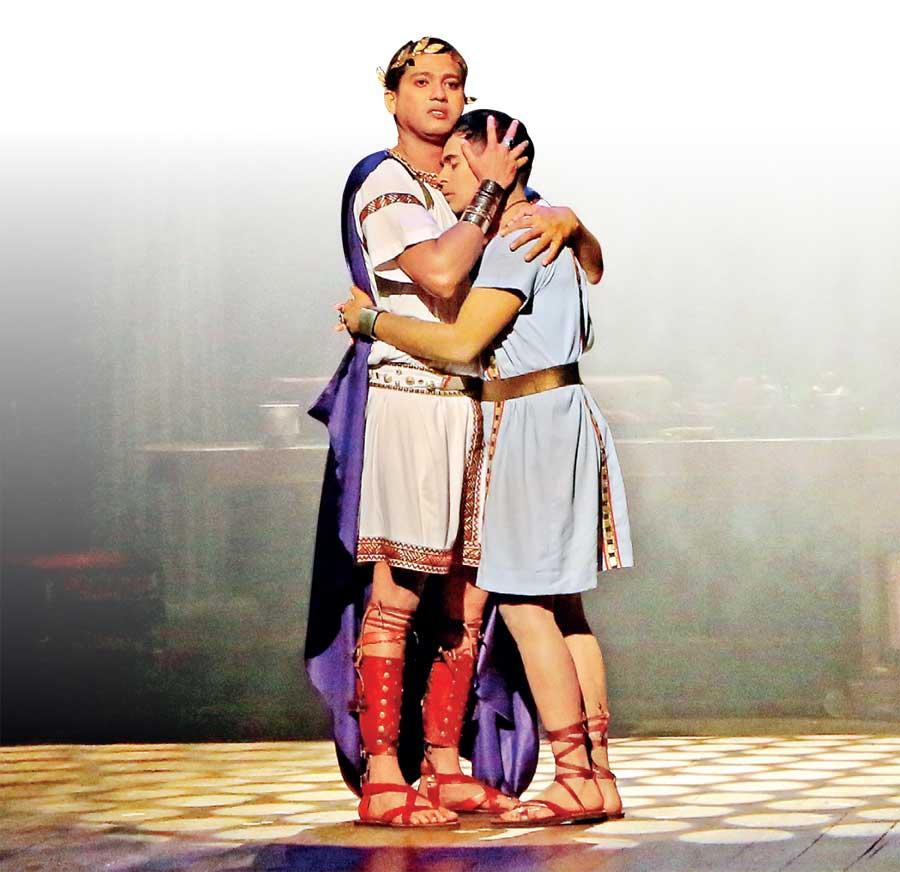04 Mar 2019 - {{hitsCtrl.values.hits}}

Happily for the Sinhala theatre, there are a few brave souls willing to risk everything to produce a classic drama.
Two years ago, Buddhika Damayantha produced a Sinhala version of Hamlet. Last week, one saw Albert Camus’ ‘Caligula’ at the Lionel Wendt, directed by Jagath Bandara Pathirage.
This is not the first time Caligula has been staged in the country. In the late 1980s, Belgian theatre director and expert on puppet theatre Rudi Corens staged an English version at the Alliance Francaise de Colombo.
It was a play reading rather than a full-fledged production but offered a brilliant performance by the late H. A. Perera as the neurotic, misogynistic Roman emperor.
Pathirage’s Caligula is a fully-fledged production, with an impressive set and the most subtle – and attractive – theatre-lighting seen on the Sinhala stage in many years.
Its major fault is that it’s too long. The kind of spectator who can concentrate on an intellectual play for nearly three hours is now an endangered species in Sri Lanka.
"A play is made universal when succeeding generations can see in its theme and situations a parallel with their own times
Edited to a shorter length, this should be a very interesting play
General flaw is that lines are spoken much too fast"
In between its philosophical discourses, the play has the vital dramatic elements of intrigue, tension and humour. But the overall length is such that the final (And very important) scene between Caligula and his mistress Caesonia seems interminably long.
Once edited to a shorter length, this should be a very interesting play; more importantly, one that challenges the spectator’s complacencies about supporting egocentric politicians who try to reshape societies according to their personal whims.
The value of democracy is that, no matter how weak-kneed it may seem compared to the reign of a ‘strongman,’ citizens (Or subjects) would be infinitely safer from the kind of vagaries and excesses that only absolute power can produce.
Julius Caesar destroyed whatever democracy there was in ancient Rome. Thereafter, Roman citizens had to pray for a sane man at the top. The lineup was very uneven. At one end, there was Marcus Aurelius. At the other, Nero and Caligula.
But Albert Camus, when he wrote this play in the late 1930s (With fascism and Nazism about to grip Europe by the throat) was not actually concerned so much with the biographical details of Caligula’s life – Caligula’s famous horse doesn’t figure in this play.
Camus also rejected the ‘madman’ thesis handed down by history. Madness would exonerate Caligula a great deal.
Instead, Camus described an unstable, often hysterical young man who loves the power he has to make Rome’s socio-political heavyweights (The patricians) squirm.
He also realizes that, by doing this, he will drive them into murdering him one day.
The dilemma that Caligula imposes on himself in Camus’ version made critics place it firmly amidst the French writer’s Existentialist views, though Camus denied that.
In the play, Caligula faces the deliberate choice of destroying people for spurious, often outrageous reasons.
He knows that he is treading a parallel path of self-destruction. The dialogues between Caligula and other principal characters – Cherea, a writer, Scipio, a young poet, Helicon, an aide, Caesonia, and several patricians who are reduced by Caligula to a state of servility and sycophancy – reveal a surprisingly melancholic side to his generally exuberant character, always threatening to spin out of control.
"The servile patricians of Caligula are echoed by Stalin’s politburo or, in our times, Sri Lanka’s own Parliament or the politicians of Zimbabwe and Venezuela"
Why produce Caligula now?
A novel or play is made universal when succeeding generations can see in its theme and situations a parallel with their own times.
The servile patricians of Caligula are echoed by Stalin’s politburo or, in our times, Sri Lanka’s own Parliament or the politicians of Zimbabwe and Venezuela.
Caligula’s misogyny and contempt for those ruled by him is reflected, in varying degrees, by the ruthlessness of Donald Trump, the Brexit madness of the British PM, the murderous ruling methods of Syria and Saudi Arabia, the ruthless immigration policies of Australia and the market-economics dictatorship of China aiming to buy the world for a song.
In short, this is a highly topical play and its creators should be lauded for their bravery because the Sinhala theatre, very much like the commercial sector anywhere, is playing safe and won’t risk its rupees on risky ‘serious theatre’ except for those few brave souls swimming against the current.
But bear in mind that this play needs serious editing; otherwise, its length would exhaust many viewers.
Apart from that, it has got most things right, including excellent performances from the cast, including an electrifying performance by Jehan Sri Kantha Appuhami as Caligula and Ganga Jeevani Weliwatta (Caesonia), Mayura Kanchana (Cherea), Amil Galanga (Helicon) and Kasun Liyanage (Scipio).
The music was by Gayathri Khemadasa.
One general flaw in the acting and one not limited to this play is that the lines are spoken much too fast, and breathlessly.
That’s a problem that the Sinhala theatre in general needs to address.

30 Nov 2024 1 hours ago
30 Nov 2024 2 hours ago
29 Nov 2024 29 Nov 2024
29 Nov 2024 29 Nov 2024
29 Nov 2024 29 Nov 2024